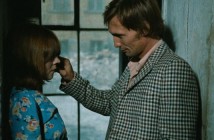
Editor’s Note: Let There Be Light: John Huston’s Wartime Documentaries, The Undesirable, I Believe in Unicorns and Of Mice and Men will be released on their respective formats on January 19, 2016. Hate Crimes in the Heartland was released on January 12, 2016.
Let There Be Light: John Huston’s Wartime Documentaries
 Let There Be Light: John Huston’s Wartime Documentaries (Olive Films) is a collection of four documentaries directed by John Huston (The Maltese Falcon, The African Queen) as part of his service as an officer in the Army Signal Corps. The documentaries reflect Huston’s changing attitudes toward war.
Let There Be Light: John Huston’s Wartime Documentaries (Olive Films) is a collection of four documentaries directed by John Huston (The Maltese Falcon, The African Queen) as part of his service as an officer in the Army Signal Corps. The documentaries reflect Huston’s changing attitudes toward war.
“Winning Your Wings” is a recruitment film for the U.S. Army Air Forces, hosted by Jimmy Stewart. “Report From the Aleutians” reveals the tedium of being stationed at a remote Army post in the islands of Alaska.
With “San Pietro,” however, Huston’s tone began to take a dark turn. Focusing on an Italian military battle that cost an estimated 1,100 American lives, the film showed the retrieval and burial of casualties. Because of the disturbing content, the Army chose not to screen the film publicly.
The final film, Let There Be Light, narrated by Walter Huston (The Treasure of the Sierra Madre), is regarded as one of the most important wartime documentaries ever made. Depicting the treatment of “psychoneurotics” (now known as post-traumatic stress disorder) through hypnosis, drugs, and psychotherapy, this one-hour film sensitizes viewers to the lasting anguish of combat more effectively than battle footage filled with graphic mayhem. Here, Huston captures the full horror of war and provides a raw look at the psychological devastation suffered by returning veterans. Some even relate their complete life stories. Completed in 1946, the film was not released until 1981.
Together, these films go beyond merely mustering support for the war effort. They personalize the day-to-day routines of men doing a job under extraordinary circumstances and illustrate the lingering effects of armed combat.
Bonus features on the unrated Blu-ray release include “San Pietro: Raw Camera Footage” and Shades of Gray, a 1948 film produced by the Army in response to civilian demand for the theatrical release of Let There Be Light. Because of public outcry over using actual shell-shock victims in Let There Be Light, Shades of Gray used professional actors.
Hate Crimes in the Heartland
 Hate Crimes in the Heartland (Virgil Films) is a documentary that portrays the violence rooted in America’s history of racial hatred by focusing on Tulsa, Oklahoma, where two hate crimes over 90 years apart are impacting human rights, education and communities today. The film is an analysis of current and past hate crimes in our country.
Hate Crimes in the Heartland (Virgil Films) is a documentary that portrays the violence rooted in America’s history of racial hatred by focusing on Tulsa, Oklahoma, where two hate crimes over 90 years apart are impacting human rights, education and communities today. The film is an analysis of current and past hate crimes in our country.
The film begins in Tulsa, where, in 2012, two white males drove through the African-American neighborhood of Greenwood targeting black people at random, killing three and badly wounding two others. Filmmaker Rachel Lyon traces the events surrounding the murders, the social media outcry, the hunt for the killers, and the capture of two suspects who were charged with first-degree murder and faced the death penalty.
The contemporary hate crime is then compared to the 1921 Tulsa race riot in which an armed white mob attacked and burned down the same Greenwood neighborhood, known at the time as “Black Wall Street” because it was considered America’s wealthiest black community. The riots were instigated by a lynch mob enraged by false reports of a white woman’s rape by a young black man. The lynching never happened. Instead, the blood-thirsty mob turned their anger toward the thriving black community and the violence rapidly escalated into a massacre of any black people the white rioters could find. Greenwood was left in ruins; 500 businesses and 1,500 homes were destroyed. Survivors either fled the town or were put into internment centers run by the National Guard.
Both stories are compelling, but the account of the 1921 riot is especially interesting because it isn’t well known, perhaps because blacks of the period were terrified of copycat incidents and so remained silent for generations. The local white population, shamed by the violence and destruction in their city, also avoided mentioning it.
Talking heads, archive footage, and interviews with those associated with both events contribute insights into the deep-seated fears and mistrust that led to such extreme action. The various interpretations of the term “hate crime” are outlined and racial profiling in media coverage is addressed.
There are no bonus features on the unrated DVD.
Of Mice and Men
 Of Mice and Men (Olive Films) is the 1992 adaptation of John Steinbeck’s 1937 novel set in the bleak world of itinerant men during the Great Depression. George (Gary Sinise) is a small, quick-witted man with no family and no money. His traveling companion, Lennie (John Malkovich), is a large man with the mind of a child and the strength of an ox. They have jobs lined up at a farm near Soledad, in the California countryside, where acres of wheat need harvesting.
Of Mice and Men (Olive Films) is the 1992 adaptation of John Steinbeck’s 1937 novel set in the bleak world of itinerant men during the Great Depression. George (Gary Sinise) is a small, quick-witted man with no family and no money. His traveling companion, Lennie (John Malkovich), is a large man with the mind of a child and the strength of an ox. They have jobs lined up at a farm near Soledad, in the California countryside, where acres of wheat need harvesting.
Soon after they start work, the farm boss’s son, Curley (Casey Siemaszko), starts picking on Lennie and before long Curley’s lonely wife (Sherilyn Fenn) begins hanging around the bunkhouse and barn, with an eye for George. Lennie’s innocent simplemindedness combined with his brute strength lead to a terrible accident, and Lennie looks to George to find a way out of a situation that spirals into tragedy.
Sinise, who serves double duty as director, is exceptional as George, providing his character with a balance of bitterness, resentment, and hope for better times ahead. This is a subtle but thoroughly engaging performance.
Malkovich is not the giant of a man Steinbeck describes, but his slurred speech, distant look, slightly crossed eyes, and lumbering gait add up to a convincing Lennie.
This screen adaptation by Horton Foote (The Trip to Bountiful) is photographed by Kenneth MacMillan in hues of gold and earth tones. Production designer David Gropman evocatively recreates the era with period vehicles, costumes, and set design that suggest a bygone time.
Bonus extras on the Blu-ray release include commentary with director Gary Sinise; conversation with director and screenwriter; making-of featurette; deleted scenes; make-up tests; Sherilyn Fenn’s screen test; and theatrical trailer.
The Undesirable
 The Undesirable (Olive Films) is a 1914 silent film by director Michael Curtiz. Betty (Lili Berky), a young woman living in the country, is told by her dying father that he is really her uncle and raised her as his own after her mother was sent to prison for killing her husband. Alone and not knowing her mother’s fate, Betty travels to the city in search of work. There she finds employment as a maid in the home of a wealthy couple and their handsome son, Nick (Victor Marconi). Betty falls in love with Nick and is fired after being unjustly accused of theft. The drama escalates with the sudden appearance of Betty’s mother Sarah (Mari Jaszai), presumed dead but recently released from prison, on a quest of her own to find her daughter.
The Undesirable (Olive Films) is a 1914 silent film by director Michael Curtiz. Betty (Lili Berky), a young woman living in the country, is told by her dying father that he is really her uncle and raised her as his own after her mother was sent to prison for killing her husband. Alone and not knowing her mother’s fate, Betty travels to the city in search of work. There she finds employment as a maid in the home of a wealthy couple and their handsome son, Nick (Victor Marconi). Betty falls in love with Nick and is fired after being unjustly accused of theft. The drama escalates with the sudden appearance of Betty’s mother Sarah (Mari Jaszai), presumed dead but recently released from prison, on a quest of her own to find her daughter.
Thought to be lost forever, a print of The Undesirable was recently discovered in the basement of the Hungarian House cultural center in New York and returned to Hungary for restoration. The eight-month restoration and digitalization process was accomplished by the Hungarian Filmlab, with support from the Hungarian National Digital Archive and Film Institute and the Hungarian National Film Fund and funding from the Hungarian National Film Foundation.
The film is of particular interest because Curtiz went on to become one of Hollywood’s leading directors, responsible for Casablanca, The Adventures of Robin Hood, Captain Blood, Yankee Doodle Dandy, The Sea Hawk, Mildred Pierce, White Christmas and many others. He cast Bing Crosby, Joan Crawford, Errol Flynn, Doris Day, Cary Grant, John Garfield, Elvis Presley, John Wayne, Humphrey Bogart, William Powell, Irene Dunne and James Cagney, among others.
The restored version, not rated, features a newly commissioned score by Attila Pacsay performed by the Pannonia Symphony Orchestra, and conducted by Peter Illenyi. The Blu-ray release is in black and white in the 1:33 aspect ratio. There are no bonus extras.
I Believe in Unicorns
 I Believe in Unicorns (IndiePix Films) is a coming-of-age tale from first-time feature filmmaker Leah Meyerhoff. Davina (Natalia Dyer) is a naive, imaginative, strong-willed teenage girl who has the responsibility of caring for her handicapped mother (Toni Meyerhoff). Davina is attracted to Sterling (Peter Vack), an older skateboarder/punk/rocker to whom she looks for escape from her hard, dreary life.
I Believe in Unicorns (IndiePix Films) is a coming-of-age tale from first-time feature filmmaker Leah Meyerhoff. Davina (Natalia Dyer) is a naive, imaginative, strong-willed teenage girl who has the responsibility of caring for her handicapped mother (Toni Meyerhoff). Davina is attracted to Sterling (Peter Vack), an older skateboarder/punk/rocker to whom she looks for escape from her hard, dreary life.
Davina regards her first romantic relationship as a means to a happier, more exciting existence. Both Davina and Sterling are eager to move on in their lives since their adolescence has been terrible, with sick mothers and abusive fathers. Director Meyerhoff shows that though both teens aspire to adulthood and have begun a sexual relationship, they don’t have the emotional strength to become true adults. Ms. Dyer is both believable and sympathetic as Davina, conveying both her innocence and her desire.
Sprinkled throughout the film are stop-motion fantasy sequences containing mythological imagery. Though visually striking, they seem artsy and come off as heavy-handed attempts to portray Davina’s desperation to escape her world. The film is well made but follows a traditional coming-of-age path without standing out as something special.
There are no bonus features on the DVD release.



